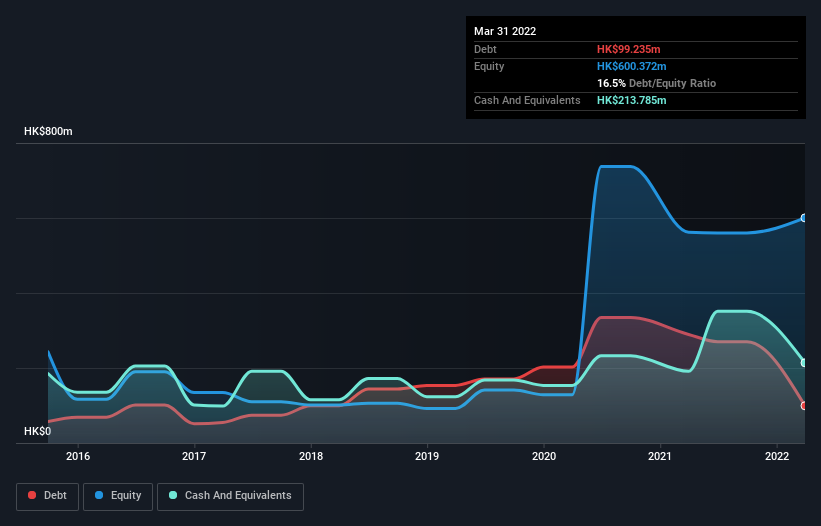- Hong Kong
- /
- Real Estate
- /
- SEHK:674
These 4 Measures Indicate That China Tangshang Holdings (HKG:674) Is Using Debt Extensively
Some say volatility, rather than debt, is the best way to think about risk as an investor, but Warren Buffett famously said that 'Volatility is far from synonymous with risk.' So it might be obvious that you need to consider debt, when you think about how risky any given stock is, because too much debt can sink a company. Importantly, China Tangshang Holdings Limited (HKG:674) does carry debt. But is this debt a concern to shareholders?
When Is Debt Dangerous?
Generally speaking, debt only becomes a real problem when a company can't easily pay it off, either by raising capital or with its own cash flow. Part and parcel of capitalism is the process of 'creative destruction' where failed businesses are mercilessly liquidated by their bankers. However, a more frequent (but still costly) occurrence is where a company must issue shares at bargain-basement prices, permanently diluting shareholders, just to shore up its balance sheet. By replacing dilution, though, debt can be an extremely good tool for businesses that need capital to invest in growth at high rates of return. When we think about a company's use of debt, we first look at cash and debt together.
Check out our latest analysis for China Tangshang Holdings
How Much Debt Does China Tangshang Holdings Carry?
The image below, which you can click on for greater detail, shows that China Tangshang Holdings had debt of HK$99.2m at the end of March 2022, a reduction from HK$289.5m over a year. But on the other hand it also has HK$213.8m in cash, leading to a HK$114.5m net cash position.

How Healthy Is China Tangshang Holdings' Balance Sheet?
Zooming in on the latest balance sheet data, we can see that China Tangshang Holdings had liabilities of HK$875.4m due within 12 months and liabilities of HK$482.5m due beyond that. On the other hand, it had cash of HK$213.8m and HK$50.1m worth of receivables due within a year. So its liabilities outweigh the sum of its cash and (near-term) receivables by HK$1.09b.
This deficit casts a shadow over the HK$331.1m company, like a colossus towering over mere mortals. So we'd watch its balance sheet closely, without a doubt. After all, China Tangshang Holdings would likely require a major re-capitalisation if it had to pay its creditors today. Given that China Tangshang Holdings has more cash than debt, we're pretty confident it can handle its debt, despite the fact that it has a lot of liabilities in total.
Notably, China Tangshang Holdings's EBIT launched higher than Elon Musk, gaining a whopping 2,484% on last year. The balance sheet is clearly the area to focus on when you are analysing debt. But it is China Tangshang Holdings's earnings that will influence how the balance sheet holds up in the future. So if you're keen to discover more about its earnings, it might be worth checking out this graph of its long term earnings trend.
Finally, while the tax-man may adore accounting profits, lenders only accept cold hard cash. China Tangshang Holdings may have net cash on the balance sheet, but it is still interesting to look at how well the business converts its earnings before interest and tax (EBIT) to free cash flow, because that will influence both its need for, and its capacity to manage debt. During the last three years, China Tangshang Holdings burned a lot of cash. While that may be a result of expenditure for growth, it does make the debt far more risky.
Summing up
Although China Tangshang Holdings's balance sheet isn't particularly strong, due to the total liabilities, it is clearly positive to see that it has net cash of HK$114.5m. And it impressed us with its EBIT growth of 2,484% over the last year. Despite the cash, we do find China Tangshang Holdings's level of total liabilities concerning, so we're not particularly comfortable with the stock. The balance sheet is clearly the area to focus on when you are analysing debt. However, not all investment risk resides within the balance sheet - far from it. Case in point: We've spotted 4 warning signs for China Tangshang Holdings you should be aware of.
Of course, if you're the type of investor who prefers buying stocks without the burden of debt, then don't hesitate to discover our exclusive list of net cash growth stocks, today.
New: AI Stock Screener & Alerts
Our new AI Stock Screener scans the market every day to uncover opportunities.
• Dividend Powerhouses (3%+ Yield)
• Undervalued Small Caps with Insider Buying
• High growth Tech and AI Companies
Or build your own from over 50 metrics.
Have feedback on this article? Concerned about the content? Get in touch with us directly. Alternatively, email editorial-team (at) simplywallst.com.
This article by Simply Wall St is general in nature. We provide commentary based on historical data and analyst forecasts only using an unbiased methodology and our articles are not intended to be financial advice. It does not constitute a recommendation to buy or sell any stock, and does not take account of your objectives, or your financial situation. We aim to bring you long-term focused analysis driven by fundamental data. Note that our analysis may not factor in the latest price-sensitive company announcements or qualitative material. Simply Wall St has no position in any stocks mentioned.
About SEHK:674
China Tangshang Holdings
An investment holding company, engages in the property investment, development, and sub-leasing activities in Hong Kong and the People’s Republic of China.
Flawless balance sheet and slightly overvalued.
Market Insights
Community Narratives




